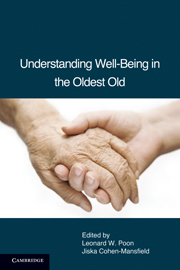Book contents
- Frontmatter
- Contents
- List of Tables
- List of Contributors
- Foreword by Carol D. Ryff
- PART I THEORY: NEW HORIZONS IN WELL-BEING RESEARCH
- PART II PARADISE LOST: BETWEEN TRAUMA AND HAPPINESS
- 6 Does Trauma Linger into Old-Old Age? Using the Holocaust Experience as a Paradigm
- 7 The Impact of Life Events on the Oldest Old
- 8 Posttraumatic Stress Disorder and Its Treatment at Late Life
- PART III PATHWAYS AND GATEKEEPERS: MODERATING, MEDIATING, AND PROXIMAL PROCESSES
- PART IV SIGNPOSTING PARADISE: MEASUREMENT OF WELL-BEING
- Index
- References
6 - Does Trauma Linger into Old-Old Age? Using the Holocaust Experience as a Paradigm
Published online by Cambridge University Press: 05 August 2012
- Frontmatter
- Contents
- List of Tables
- List of Contributors
- Foreword by Carol D. Ryff
- PART I THEORY: NEW HORIZONS IN WELL-BEING RESEARCH
- PART II PARADISE LOST: BETWEEN TRAUMA AND HAPPINESS
- 6 Does Trauma Linger into Old-Old Age? Using the Holocaust Experience as a Paradigm
- 7 The Impact of Life Events on the Oldest Old
- 8 Posttraumatic Stress Disorder and Its Treatment at Late Life
- PART III PATHWAYS AND GATEKEEPERS: MODERATING, MEDIATING, AND PROXIMAL PROCESSES
- PART IV SIGNPOSTING PARADISE: MEASUREMENT OF WELL-BEING
- Index
- References
Summary
ABSTRACT
Trauma that lingers from early to very late life poses a special threat to the labile conditions of adaptation while facing imminent frailty and death. This chapter examines long-term effects of trauma in three modes of survival into old-old age: (a) dementia-molded survival, which raises a question as to whether cognitive impairment sensitizes traumatic memories or blunts them, (b) embattled survival, which involves either a chronic confrontation with the past trauma or else its reactivation in the adverse conditions of late life, and (c) robust survival, which maintains the capacity to stay well in the face of age-related challenge as well as past trauma. Coping with past trauma under robust survival typically generates a delicate balance between general resilience and specific vulnerabilities. This chapter dwells on research of old and old-old Holocaust survivors, who provide a paradigm for the special challenge of long-term effects of extreme trauma.
LIFETIME TRAUMA AND SURVIVAL IN OLD-OLD AGE
A key issue that developmental models need to account for is the combined impact of distal influences, such as adverse events early in life, and proximal influences, such as recent experiences and resources (Martin & Martin, 2002; see Chapter 5). As developmental trajectories become increasingly obscured and labile in old-old age (Baltes, 1997; Poon & Perls, 2007), the interactive effects of distal trauma and proximal age-related experiences are particularly intricate or unpredictable.
- Type
- Chapter
- Information
- Understanding Well-Being in the Oldest Old , pp. 81 - 95Publisher: Cambridge University PressPrint publication year: 2011
References
- 12
- Cited by



